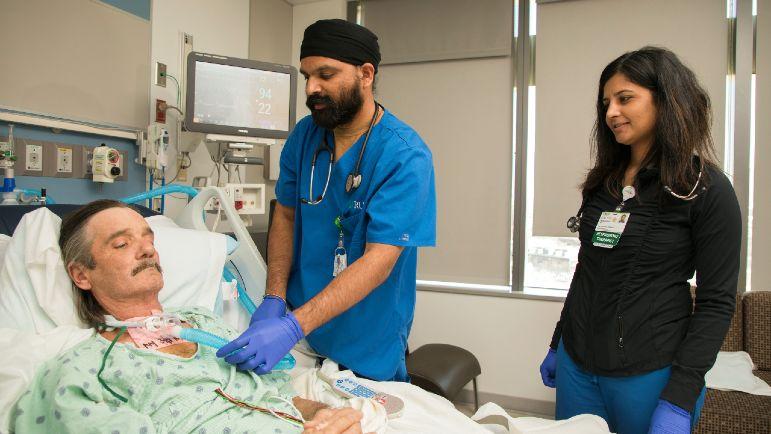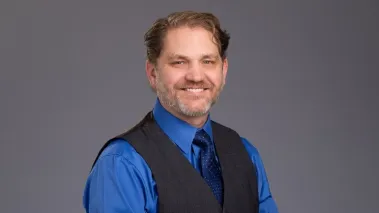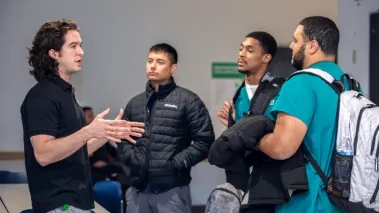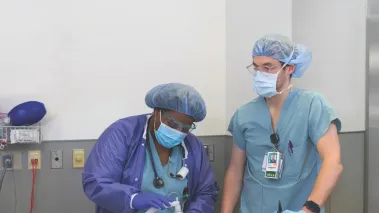Are you finding it challenging to advance your career in respiratory care? A master’s degree in the field can give you a second breath.
The degree can open up an array of options as you pursue employment paths focused on assisting patients with breathing problems due to respiratory and cardiovascular issues. And you’re not alone. There has been more interest in respiratory therapist work since the COVID-19 pandemic has highlighted the importance of the field.
Let’s demystify the ins and outs of an advanced respiratory therapist degree to help take your career to the next level.
What is a master's degree in respiratory care?
The Master of Science in Respiratory Care degree has a curriculum designed to give respiratory therapists the skills needed for leadership, research and education roles in the field.
Students are taught to increase their critical thinking ability, which allows them to better tailor treatment based on individual patient circumstances. That ultimately leads to better health outcomes for patients.
What can you do with a master’s in respiratory care?
The following are some of the career paths for someone who has completed a master’s degree in respiratory care:
- Industry work: provide education to clinicians about new respiratory care equipment developed by companies
- Leadership positions: advanced roles in include respiratory care department manager, director or supervisor
- Education: teach respiratory care to associate and bachelor’s students, and fill clinical educator roles that teach practicing respiratory therapists
- Respiratory care infection control: collect data and monitor infections within the hospital for quality improvement
- Registered respiratory therapist (RRT): Specialize in particular areas (e.g., neonatal, geriatric, critical care) and work in a variety of settings, including hospitals, nursing homes and rehabilitation centers
Why should a respiratory therapist pursue a master’s degree?
Respiratory therapists pursuing a master’s degree in the field will obtain a higher level of clinical understanding. Their training includes courses in management to give them the skills to become a leader in the field. The degree also sets them up nicely to qualify for teaching positions to help train future respiratory therapists.
And students take a deeper dive into respiratory care research. That gives them the ability to add a research role to their job responsibilities. It also provides them the skills and confidence to analyze the latest research in the field and apply it in the clinic to improve patient care.
There is no shortage of job opportunities in respiratory therapy, but a master’s in respiratory therapy will set students apart from their colleagues when applying for the more desirable positions.
“There are approximately 70 respiratory care bachelor’s programs in the country, but there are only five or six entry-level master’s programs,” says David Vines, PhD, MHS, RRT, director of the Master of Science in Respiratory Care program in the College of Health Sciences at Rush University. “So an advanced degree creates a differentiator for yourself as you pursue a wide array of positions that sometimes need an master’s degree for advancement opportunities.
How long does it take to get a master's degree in respiratory therapy?
A master’s in respiratory therapy takes approximately two years to complete. That includes a combination of coursework and hands-on experience in a clinical setting.
Why Rush University for a master’s degree in respiratory care?
Rush is the only school in Illinois and one of just a handful in the country to offer a master’s in respiratory therapy degree. Rush’s respiratory therapist program prides itself in excellence in a variety of areas:
Academic medicine: Students receive an education not only from respiratory care faculty but also from experienced clinicians in other fields while taking care of patients in the clinic. Students train at one of the top academic medical centers in the country.
Board results: Graduates from 2019 - 2021 have a 100% success rate earning CRT (certified respiratory therapist) and RRT (registered respiratory care) credentials.
- Leaders in COVID-19 research and patient care: Students learn from a Rush respiratory care team was recently honored with two APEX Recognition Awards in the acute care hospital and educational program categories for its work during the COVID-19 pandemic. Faculty-clinicians at Rush have contributed essential science in respiratory care and patient care techniques.
- Leadership preparation: The respiratory therapist education curriculum, taught by nationally and internationally known faculty, is tailored to develop leaders in the field.
- Low student-to-faculty ratio: The program takes no more than 25 students a year to give them more individual attention.
- Research opportunities: Faculty are also clinician-researchers who publish their work in highly respected journals. Many students who work with faculty go on to have their own work published.
- Return on investment: A survey shows that program graduates from 2011-2018 saw a $4,000-$5,000 increase in salary every year after graduation.
“It’s a highly rewarding field,” Vines says. “Respiratory therapists work with the patient’s clinical team to make adjustments that can make a big difference in the patient’s comfort level and health outcome. It’s often very fulfilling.”
Learn more about the Master of Science in Respiratory Care program at Rush.







